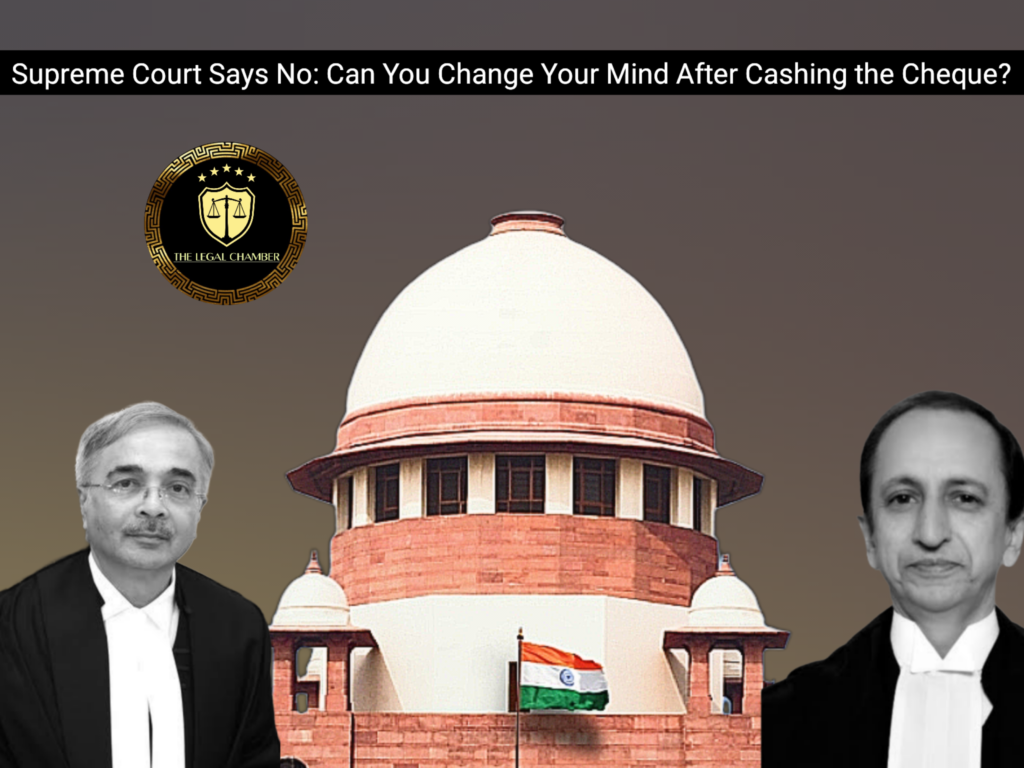
The Supreme Court dismissed the appeal, upholding the rejection of a time-barred review petition. It affirmed the legal principle that a party cannot “approbate and reprobate”—they cannot accept a benefit under an order and later challenge it. A party who voluntarily accepts compensation with full knowledge is bound by their conduct and cannot subsequently resile from it.
Facts Of The Case:
In a motor accident claim case concerning the death of Priyank Chand, the Motor Accident Claims Tribunal awarded a total compensation of approximately Rs. 11.82 lakh to his legal heirs: his mother (Urmila Chand, the appellant), his wife (Sonu Chand), and his two minor children. Upon a joint application filed by all claimants, including Urmila, the Tribunal passed a disbursement order on 21.04.2015. As per this order, the mother received Rs. 1,00,000, the wife received over Rs. 6 lakh, and the minors’ shares were directed to be put in fixed deposits. Urmila Chand was present in court, accepted the cheque, encashed it, and signed the court’s order sheet acknowledging receipt. Subsequently, she developed grievances about the apportionment and filed a review petition against the disbursement order after a significant delay of over six months, which she attributed to medical issues. Both the Tribunal and the High Court dismissed her petition, primarily on the grounds of delay and lack of satisfactory explanation. The courts also heavily relied on her conduct, noting that having voluntarily accepted the benefit without protest, she was now estopped from challenging the order.
Procedural History:
The case originated with a compensation award from the Motor Accident Claims Tribunal (MACT), Tinsukia. Dissatisfied with the subsequent disbursement order, the appellant, Urmila Chand, first filed a review petition before the MACT, which was dismissed as being barred by limitation. She then challenged this dismissal by filing a Civil Revision Petition before the Gauhati High Court. The High Court, in its impugned order, refused to exercise its supervisory jurisdiction and upheld the MACT’s decision, confirming the rejection on both the grounds of delay and the merits of the appellant’s conduct. This chain of events led to the final appeal before the Supreme Court, which culminated in the present judgment.
READ ALSO:Supreme Court Revives Cheque Bounce Cases, Says ‘Sick Company’ Status is Not a Get-Out-of-Jail Card
Court Observation:
The Supreme Court made crucial observations on the appellant’s conduct, holding that a party cannot be permitted to “approbate and reprobate”—she cannot voluntarily accept a substantial benefit under an order and later challenge its validity. The Court noted that the appellant had not only jointly applied for the disbursement but had also accepted the cheque of Rs. 1,00,000 with full knowledge, encashed it without demur, and confirmed receipt by signing the court’s order sheet. This conscious and overt conduct, undertaken with “open eyes,” meant she was deemed to have accepted the terms of the disbursement order and was consequently estopped from resiling from her own actions at a later stage. The Court thus found no error in the decisions of the lower courts, which had rightly dismissed her belated challenge.
Final Decision & Judgement:
The Supreme Court dismissed the appeal, upholding the decisions of both the Motor Accident Claims Tribunal and the Gauhati High Court. The Court concluded that the appellant, by jointly applying for disbursement and then voluntarily accepting, encashing, and signing for the compensation cheque without any protest, was bound by her own conduct. It ruled that she could not subsequently challenge the apportionment after having benefited from it, applying the principle that a party cannot “approbate and reprobate.” Finding no merit in the appeal, the Court affirmed that the review petition was rightly rejected on the grounds of both delay and the appellant’s conduct on the merits.
Case Details:
Case Title: Urmila Chand vs Sonu Chand and Others Citation: 2025 INSC 1072 Appeal Number: Civil Appeal No. 1352 of 2023 Date of Judgement: September 3, 2025 Judges/Justice Name: Justice N.V. Anjaria and Justice Atul S. Chandurkar
Download The Judgement Here